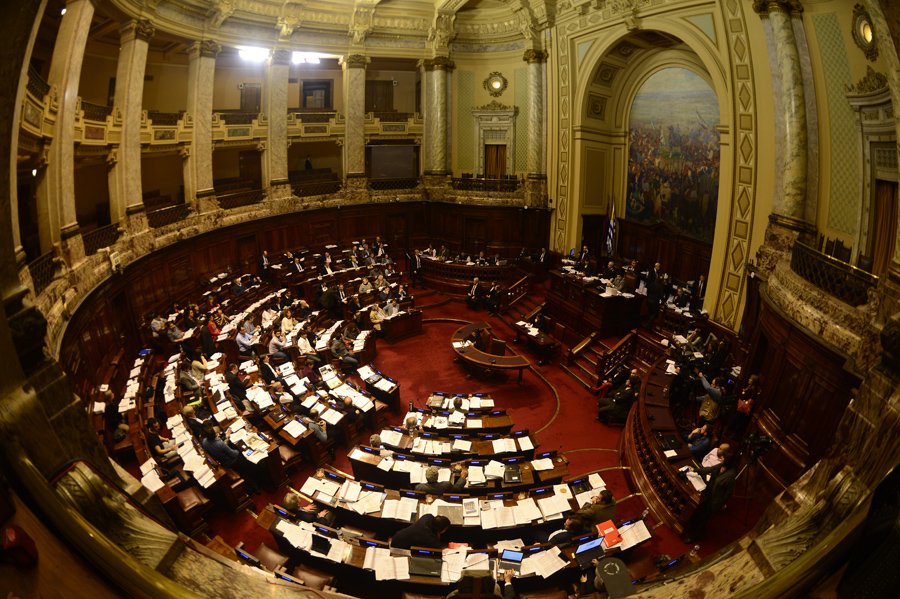RIO DE JANEIRO, BRAZIL – The Uruguayan government presented its main bill, the Law of Urgent Consideration (LUC), comprising 502 articles that entail a profound reform in the country. With a controversial format, typically reserved for emergency issues and including an automatic approval after 90 days, the LUC is unrelated to the coronavirus epidemic and requires a marathon of parliamentary in-person sessions.

The conservative coalition led by President Luis Lacalle Pou believes that the proceedings should not be deferred on account of Covid-19, first because it is an electoral commitment, and second, because it is urgently needed, given the situation the country is facing on issues such as public insecurity and fiscal balance. Several chapters of the reform include granting increased powers to the security forces and toughening the Penal Code, particularly for minors.
On the economic front, the LUC establishes a new fiscal regime, with limitations on public spending, stricter than the current ones, in addition to reducing the number of state employees and changing the operation of state-owned companies that control crucial sectors such as power, water, fuel, and telecommunications.
According to the explanatory memorandum submitted by the government, LUC’s main goal is, among others, “to establish a number of legal norms for the purpose of restoring, in the shortest time possible, the required conditions to ensure the peaceful coexistence of the people who inhabit our country”.
As for economic changes, the need to impose “adequate control of public spending, generating savings based on its reduction” is emphasized. “The prevailing situation by which the adjustment is carried out by the private sector is no longer sustainable. It is the State that must adjust the costs,” points out the text.
But the LUC is much broader and implies the repeal of more than 60 laws enacted during the 15 years of the left-wing Broad Front government. Thus, norms that regulate the public education system are changed, a debate on pensions is opened, the law of financial inclusion is changed, and such disparate topics as the creation of a registry of rapists and the change in the policy of protected areas for environmental reasons are covered.
Masks in Congress
The first cases of coronavirus in Uruguay occurred in mid-March, and on April 12th the government declared a state of emergency and suggested a voluntary quarantine which brought economic activity to a virtual halt.
The early confinement seems to have successfully contained the contagion, with only 12 deaths among its 3.5 million inhabitants by April 24th, and the health system is showing no signs of collapse. But the economy is severely impacted, with thousands of people unemployed and gloomy prospects for businesses.
Although the first data on exports of raw materials are relatively positive, since Asia has reactivated its purchases, the Uruguayan economy and its fiscal balance are sustained by internal consumption, which has collapsed with no date for recovery.
In this context, Congress has plunged into a legislative marathon that began last Thursday and will require in-person sessions from 9 AM to 6 PM from Monday to Thursday in dozens of Chamber and Senate committees, all to be held at the headquarters of the Legislative Palace and its annexes.
The Uruguayan parliament cannot decide or vote remotely, because in order to do so it would need to change its statute and have appropriate technology, something that could occur in the course of the LUC proceedings, according to legislators who this week submitted a proposal to this end.
The photos from recent days show deputies and senators covered with masks or other facial protection, keeping a distance of several seats from each other. With an average age of 60 (and some octogenarians), the Senate has a significant population at risk. The situation among deputies is somewhat better, with an average age of 50.
Although the right-wing coalition that governs the country holds a majority, the LUC reached Congress without prior agreement between the constituent parties, so negotiations that could lead to changes in 50 to 100 measures are expected.

The opposition rejects
The left-wing Broad Front (FA) opposition rejects the urgency and the government reforms. Legislators will argue that the LUC is unconstitutional due to its scope and because the tacit approval procedure authorized in times of emergency is unwarranted.
Broad Front Senator Lucia Topolansky noted that “there is no precedent for a law of urgent consideration with such a large number of articles” in Uruguay, and considers that the LUC sets “a very dangerous precedent,” because if “within five years a party wins the next elections, has its majority and submits a law of urgent consideration with 3,000 articles, Congress is over.”
But at this stage, the opposition has little or no chance of halting the law, since the government holds a majority in both houses. Sectors of the Broad Front propose a campaign to collect signatures to call a repeal referendum and annul it as a whole once approved.
Organizations of all sorts have voiced their criticism of LUC. The UNICEF (UN agency for children), for one, considers that the draft bill conflicts with the international principles of protection of human and children’s rights, since it increases prison sentences for minors from two to ten years and abolishes the semi-liberty system, among others.
According to a UNICEF document sent to legislators, the government is not considering the clear decrease in the involvement of adolescents in crimes recorded in recent years.
In an entirely different context, jurists caution against changes to the current Law on Financial Inclusion, voted by the Broad Front to force the payment of salaries and other transactions to be carried out by electronic means.
LUC repeals these provisions and authorizes purchases of goods in cash in transactions of up to US$10,000; it also reduces control mechanisms over agents in the payment chain. In this context, Uruguay could once again be in the sights of anti-money laundering bodies like the OECD, which in the past placed the country on its grey list.
The situation is tense with the single workers’ union, the PIT-CNT, since the LUC restricts certain chapters of the right to protest and, if it is passed in the midst of the Covid-19 epidemic, the unions will have little room to mobilize.
Source: El País

